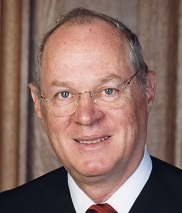By Bob Allen
The U.S. Supreme Court ruled 5-4 May 5 that overtly Christian prayers at government meetings do not violate the First Amendment’s ban on establishing religion.
 Writing for the majority, Justice Anthony Kennedy said the town of Greece, N.Y.’s, practice of opening council meetings with prayers led by a local minister is in keeping with the long tradition of “legislative prayer,” consistent with both houses of Congress maintaining a chaplain to open each day’s session with prayer.
Writing for the majority, Justice Anthony Kennedy said the town of Greece, N.Y.’s, practice of opening council meetings with prayers led by a local minister is in keeping with the long tradition of “legislative prayer,” consistent with both houses of Congress maintaining a chaplain to open each day’s session with prayer.
“As practiced by Congress since the framing of the Constitution, legislative prayer lends gravity to public business, reminds lawmakers to transcend petty differences in pursuit of a higher purpose and expresses a common aspiration to a just and peaceful society,” Kennedy wrote.
The majority reversed a ruling of the 2nd U.S. Circuit Court of Appeals that because the prayers were overwhelmingly led by Christians, the practice gave the appearance that the town was endorsing one religion over others. The parties in the lawsuit, Town of Greece v. Galloway, did not oppose the use of ceremonial prayer but argued that it must be non-sectarian.
Kennedy said it would be more problematic for the government to decide what constitutes a permissible prayer.
“The First Amendment is not a majority rule, and government may not seek to define permissible categories of religious speech,” Kennedy opined. “Once it invites prayer into the public sphere, government must permit a prayer giver to address his or her own God or gods as conscience dictates, unfettered by what an administrator or judge considers to be non-sectarian.”
The Baptist Joint Committee for Religious Liberty had filed a friend-of-the-court brief asking the Supreme Court to strike down the town’s prayer policy, arguing “that prayer is an expression of voluntary religious devotion, not the business of the government.”
In a statement May 5, the BJC expressed disappointment with the ruling.
“While the Court ruled for the town under the historic tradition of ceremonial prayer for lawmakers, local governments can — and should — take steps to ensure that citizens are not forced into religious acts at a government meeting,” said Hollyn Hollman, BJC general counsel. “It is hard to square a government-led religious practice in a local municipal meeting with the Constitution’s guarantee of equal rights of citizenship without regard to religion.”
Russell Moore, president of the Ethics and Religious Liberty Commission of the Southern Baptist Convention, said the Supreme Court “did the right thing” in reversing the lower court’s decision.
“The Town of Greece case is about a government seeking to establish a state-ordered civil religion that crowds out the most basic rights of freedom of speech,” Moore said in a written statement. “That is not what our ancestors, and their allies among the American Founders, meant by religious liberty.”
Barry Lynn, executive director of Americans United for Separation of Church and State, was disappointed by the ruling.
“The Supreme Court just relegated millions of Americans — both believers and nonbelievers — to second-class citizenship,” said Lynn, an ordained minister in the United Church of Christ. “Government should not be in the business of forcing faith on anyone, and now all who attend meetings of their local boards could be subjected to the religion of the majority.”
Joining Kennedy in the majority opinion were Chief Justice John Roberts and Associate Justice Samuel Alito. Justices Antonin Scalia and Clarence Thomas concurred in part.
Justice Elena Kagan — joined by Justices Ruth Bader Ginsburg, Stephen Breyer and Sonia Sotomayor — said in a dissenting opinion that the town’s prayer practice “does not square with the First Amendment’s promise that every citizen, irrespective of her religion, owns an equal share in her government.”
Kagan said she disagreed with the argument that prayers offered in Jesus’ name were “ceremonial” in nature.
“These are statements of profound belief and deep meaning, subscribed to by many, denied by some,” Kagan said. “If they (and the central tenets of other religions) ever become mere ceremony, this country will be a fundamentally different — and, I think, poorer — place to live.”
